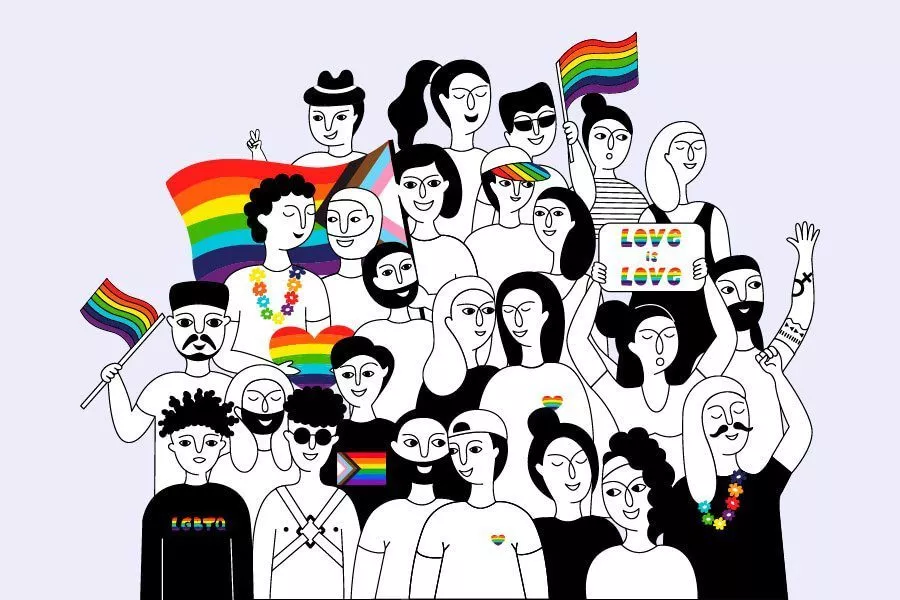The mental health challenges faced by young people have been a topic of discussion, particularly during the pandemic. Two years of restrictions have affected teenagers’ school, friendships, and hobbies – all of the pillars of youth. It is normal for young people to react to the pandemic and its consequences. Adults, whether parents or health care professionals, should be on the lookout for changes in young people’s behaviour, and actively ask them how they are doing.
Did you know, that…
21% of young people experience moderate or severe anxiety*
14% of young people feel lonely*
39% of young people have been concerned about their mood within the last year*
How are young Finns doing?
The managing director of Sekaisin Kollektiivi Satu Raappana explains that young people often experience anxiety as an unexplained sensation that can feel like a lump in the chest. Young people think about relationships, sexuality, loneliness, and everyday coping. Every day, trained volunteers are on-call in Sekaisin Kollektiivi’s Sekaisin chat to help young people in challenging situations.
“Signs of feeling unwell vary from person to person. Some people lose sleep and can’t shake a feeling of melancholy. Other young people might feel tearful and withdraw, while others go into overdrive. I encourage parents and teachers, as well as young people themselves, to identify changes, as they can sometimes communicate a need for help. Help is available and must be sought at a low threshold, rather than wait for things to get out of hand. The stigma surrounding mental health problems must be reduced, and reaching out for help doesn’t make anyone a bad person or a failure,” summarizes Satu.
Sekaisin Kollektiivi’s services are just one way to seek help. It’s important to find a person who can openly interact with the young person and be present. Some young people find it easier to write than to talk, and others prefer to speak face-to-face. However help is sought, the most important thing is to find glimmers of light in even the most difficult situations in life.
The consequences of coronavirus
Some young people feel that the coronavirus has cast a dark shadow over their future, and young people don’t necessarily have the resources to imagine a time after coronavirus. The media has written about a “mental health time bomb” among young people, which labels them as problematic.
“Young people are valued, no matter their reactions. The most important thing is to organize channels for seeking help, develop a wide range of services, and to interact with young people online. School socials workers often have scant resources, and some young people are loyal in that they think that a friend needs more help than they do, and so they don’t ask the school health care for help. Luckily, young people’s minds are resilient, and even after difficult periods, when given the correct support, they can return to how they were,” Satu says.
A word to young people and instructions for adults
“To all young people, I want to say: don’t give up. Everyone fails sometimes, and you don’t need to be the best at everything. Life changes every day, and in the future all options are possible – that goes for everyone. If your studies have gone a bit downhill during the pandemic, it’s not so serious. The most important thing is to look after your mental health and friendships. Take a moment to get to know yourself and learn social skills. If you have any self-destructive thoughts, be brave and speak up about them – all research shows that talking helps. Help is available and should be sought, even if you aren’t quite sure what’s wrong. Very few mental health problems last forever, and you can live a good, normal life despite a diagnosis,” she adds, encouragingly.
“I would remind adults to ask young people how they’re doing. Young people can find it difficult to talk to their parents about their life, but they still need to be given the space and opportunity to put their feelings into words. Adults must nurture everyday encounters, foster a good atmosphere, and have plenty of patience. Even if a young person is confrontational and slams doors, the parent must tolerate it and provide love. You never know when the young person’s behaviour will change and they genuinely want to talk about how they’re doing,” Satu advises.
Where is help available for mental health problems?
The Sekasin chat is open every day of the year
Sekaisin Gaming is Finland’s largest professionally moderated online community aimed at young people
Health care at the young person’s own school
*Source: School health survey 2021





